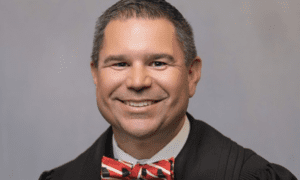A panel of healthcare professionals met at the library in Fayetteville recently to inform 80 area residents about some of the aspects of the federal Affordable Care Act, also known as Obamacare. The 2013 Issues Conference: Decoding the Affordable Care Act was sponsored by Democratic District 63 Rep. Ronnie Mabra and the Fayette County Democratic Committee.
The intent of the conference was to help individuals understand the implications of the new health care law and highlight its major provisions, Mabra said. The conference featured presentations and discussion by what was billed as an expert, non-partisan panel followed by a question and answer session.
The panel included Starla Hairston-Blanks, director of Health Promotion and Policy Development Community Voices: Healthcare for the Underserved at the Morehouse School of Medicine, Outreach and Advocacy Director for Georgians for a Healthy Future Amanda Ptashkin and the Georgia Watch Health Access Program Director Bill Rencher.
Dr. Natalie Hernandez from the Morehouse School of Medicine asked questions of the panel ranging from what veterans can expect from the new law to how young adults are affected after leaving their parents’ insurance plan, Mabra said.
Hairston-Blanks spoke extensively on the individual mandate, health-based exchanges meant to help individuals make comparisons between insurance plans and employer requirements.
Rencher described a previous position he held in a firm where two of his co-workers suffered from chronic, pre-existing conditions that drove up premiums for everyone in the office by as much as 40 percent.
“Rate hikes are going to be a thing of the past,” Ptashkin told the audience. “Anything above a ten-percent increase is triggered for review.”
The panelists agreed that businesses might reduce the number of their full-time employees to less than 49 in order to avoid paying premiums.
Ptashkin also noted that 86 percent of small business in Georgia are eligible for tax credits.
Mabra said the outcome of the discussion was that the Affordable Care Act only pertains to insurance and how much citizens will pay out of pocket. This law does not address the quality or quantity of healthcare in America, he said.
Mabra said a myth dispelled at the conference was in regard to the so-called “death panels,” which each panelist stressed was illegal, immoral and not going to happen.
For more information on the 2013 Issues Conference visit www.fayettedems.org.












Leave a Comment
You must be logged in to post a comment.